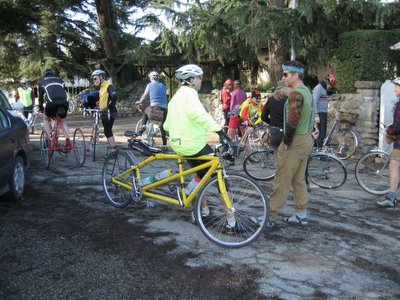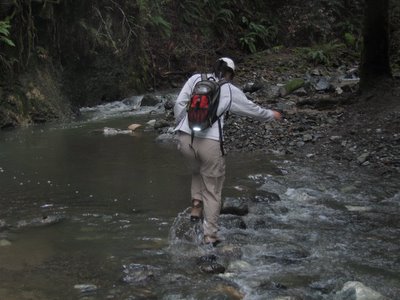

I'm a husband, father, author, cyclist, sailor, travel addict, and Silicon Valley software engineer. I've written 4 books and actively review books on this blog. Comments on this blog are aggressively moderated against link-spam and rude or meaningless comments.
 I'd never done the Saratoga loop hike before --- I've always just mountain biked it, but in winter part of the trails are closed to mountain bikes, so I got Shyam & Yajie to hike it with me. The river is wide (but mosquito free because it was quite cold), and the hike back up on Charcoal Road is just as hard as I remember biking it. (This was the easier of the two stream crossings --- at the other stream crossing, I was too busy taking off my shoes, tossing them across the stream, and then wading in the cold river to take any pictures)
I'd never done the Saratoga loop hike before --- I've always just mountain biked it, but in winter part of the trails are closed to mountain bikes, so I got Shyam & Yajie to hike it with me. The river is wide (but mosquito free because it was quite cold), and the hike back up on Charcoal Road is just as hard as I remember biking it. (This was the easier of the two stream crossings --- at the other stream crossing, I was too busy taking off my shoes, tossing them across the stream, and then wading in the cold river to take any pictures) 
 I was very tempted to title this post: "Republicans are Evil, Part V". Lara Hansen, Senior Scientist of Climate Change at the World Wildlife Fund came to give a talk about the impact of global warming on animal habitats, and mentioned in passing that the American Pika is one of the most affected by global warming.
I was very tempted to title this post: "Republicans are Evil, Part V". Lara Hansen, Senior Scientist of Climate Change at the World Wildlife Fund came to give a talk about the impact of global warming on animal habitats, and mentioned in passing that the American Pika is one of the most affected by global warming.
Why was Shiller wrong? In an arithmetic sense, we can point to three factors, each of which can take roughly one-third the credit for real American stock returns of 6% per year over the past decade rather than zero:


 We had a full rainbow this morning from the apartment window. It was one of those days that made you feel like sleeping in, but the rainbow made getting up early worthwhile.
We had a full rainbow this morning from the apartment window. It was one of those days that made you feel like sleeping in, but the rainbow made getting up early worthwhile. 
 Yajie asked me why I turn on the flash when shooting during the day, and ironically, this photograph provides an excellent example. The sun was shining from the right, which would have created dark shadows along the left side of her face in this picture. The fill flash from the camera lit up the side of her face enough to provide definition (without over-powering it), while also giving us a little bit of fill-light in her eye to liven it up a bit. This technique works well on both people and animals.
Yajie asked me why I turn on the flash when shooting during the day, and ironically, this photograph provides an excellent example. The sun was shining from the right, which would have created dark shadows along the left side of her face in this picture. The fill flash from the camera lit up the side of her face enough to provide definition (without over-powering it), while also giving us a little bit of fill-light in her eye to liven it up a bit. This technique works well on both people and animals.
 Looking South from Windy Hill OSP, you can see ridge after ridge. The little bit of haze today gave it a dreamy feeling.
Looking South from Windy Hill OSP, you can see ridge after ridge. The little bit of haze today gave it a dreamy feeling. 
 Windy Hill Open Space Preserve is one of several spots along the coast where you can see the Ocean and the Bay at the same time. (The others being Russian Ridge and Black Mountain summit)
Windy Hill Open Space Preserve is one of several spots along the coast where you can see the Ocean and the Bay at the same time. (The others being Russian Ridge and Black Mountain summit)
 I neglected to shoot a picture of this last week. The haze is probably smog from the windless days we've had recently. The Bay Area has great air quality only because the ocean wind usually blows it inland to Fresno and Sacramento valleys. With an off-shore flow the last couple of days that hasn't been happening.
I neglected to shoot a picture of this last week. The haze is probably smog from the windless days we've had recently. The Bay Area has great air quality only because the ocean wind usually blows it inland to Fresno and Sacramento valleys. With an off-shore flow the last couple of days that hasn't been happening. 